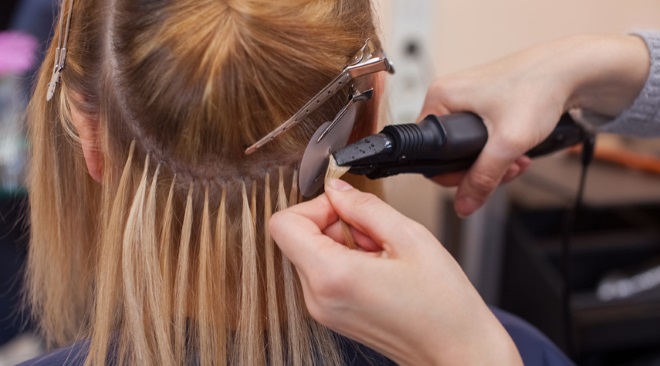
Hairdresser applying hair extensions
When we read magazines, watch TV, surf the internet and practically anything else really, we’re confronted by a constant barrage of beautiful models and famous celebrities with heads full of flowing hair. It’s enough to make you green with hair envy!
This is one of the reasons why hair extensions are increasing in popularity. In fact, the number of British women using extensions has reportedly risen by 70% in the past five years so the overall figure’s now into tens of thousands each year.
For some of us, our hair just won’t grow past our shoulders or look voluminous, try as we might. For others, over-styling and over-treating has caused damage that’s not easily repairable. For others still, when special occasions beckon, we simply want our hair looking at its best.
Replicating billboard-ready hair can be achieved with hair extensions but, like all types of hair treatments, there are pros and cons. It’s important to weigh these up before you reach for the phone to book your hairdressing appointment.
Starting with the positives, here are some of the pros…
- It fixes all multitude of sins. Extensions add length and can be used even if your hair’s very short (around 3 inches, to be precise). They can add volume if your hair’s fine, limp or thinning. They can add highlights of colour if you’re looking for an alternative to dyeing.
- The application process isn’t painful. Methods include braiding, gluing, weaving or, most gentle, clipping. Whichever you choose, it shouldn’t hurt at all.
- They’re not hard to maintain. Contrary to preconception, they’re no more difficult than other hair treatments such as dyeing. The trick is to keep an eye on them and plan for an hour at the salon for upkeep every six weeks or so.
All well and good, but now we turn our attention to the cons, of which there are a fair few…
- They’re expensive. Costs vary from several hundred to over a thousand pounds, depending on the type of hair and bonding method used.
- They require careful care. If you buy synthetic hair, styling options are limited. Even if you buy human hair, a softly softly approach is still advised which means, amongst other things, using a special brush, lighter shampoo and conditioner, cool water for washing, sleeping with your hair tied back and regular hairdressing appointments.
- There’s an unethical side to human hair extensions. Britain’s apparently the world’s third largest importer. The hair trade is said to exploit poverty-stricken donors in some of the poorest countries to cut off their hair for as little as £30-ish or even for free if pledged in the name of religion. Hair’s even taken by force by gangs. The way hair’s processed too has a shady side, often exploiting cheap labour to untangle, smooth, sort, comb, tie, soak and dye hair ready for shipping overseas.
- They can cause irrecoverable damage to your own hair. With the wrong application method and too-heavy extensions, you can suffer from hair loss called traction alopecia because too much tension’s placed on the roots thereby pulling out hair and damaging follicles permanently. If your hair’s in bad condition to begin with, it’s only going to get worse with additional strain on it.
So, if you’re thinking about extensions, seek a professional who’s undergone the right training and ask questions which allow you to make an informed decision about the best type of extensions for you. And, if you notice anything amiss, such as the beginnings of hair loss, address it straight away.
Best case, your hair will end up looking longer, thicker and healthier than it ever has before. Worst case, you may have a hairdresser claims situation on your hands for which you’ll need expert legal assistance.
